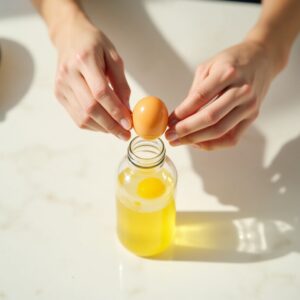ADVERTISEMENT

This kitchen hack isn’t magic — it’s science! As eggs age, air gradually seeps in through the shell. The more air inside, the more buoyant the egg becomes. A fresh egg has very little air, so it stays at the bottom. An old or spoiled egg has absorbed more air, making it float.
The egg float test is a time-tested method that many home cooks and chefs trust for its simplicity and accuracy.
Tips for Storing Eggs to Keep Them Fresher Longer
Want to avoid spoiled eggs in the first place? Try these egg storage tips:
- Keep them in the fridge.
The ideal temperature is 35–40°F. - Store in the original carton.
It protects the eggs and prevents them from absorbing fridge odors. - Keep them on a shelf, not the door.
The door is exposed to warm air each time it opens, which can reduce egg lifespan. - Label with the date.
Use a marker to note when you bought them.
Other Ways to Check Egg Freshness (If You’re Still Unsure)
If you’re still hesitant after the float test, here are a couple of backup methods:
1. The Sniff Test
Crack the egg into a bowl.
- Smells fine? You’re probably good to go.
- Smells bad? Don’t even think about cooking it.
2. The Shake Test
Hold the egg close to your ear and shake it gently.
- Sloshing sound? It’s likely old.
- No sound? Likely still fresh.
3. The Visual Test
Look for:
- Discoloration
- Cloudy whites
- Unusual spots
While not always reliable on their own, these signs can confirm the float test results.
Common Myths About Egg Freshness

Let’s clear up a few common misconceptions:
- “The expiration date is the only thing that matters.”
Not true. Eggs often stay good for weeks after the printed date. - “All floating eggs are bad.”
Usually, yes — but sometimes eggs that float are still usable for baking if they don’t smell off. Use your best judgment. - “Washing eggs keeps them fresh longer.”
Actually, washing can remove the egg’s natural protective coating. It’s best to store them as they are.
Final Thoughts
The next time you’re unsure whether your eggs are still good, try the egg float test. It’s one of the easiest and most effective kitchen hacks out there. No special tools needed — just a bowl of water and a few seconds of your time.
Not only can this method help you avoid spoiled eggs, but it can also reduce food waste and save money. Win-win!
Ready to Crack the Egg Freshness Code?
If you found this tip helpful, share it with your friends or leave a comment below! Have your own clever kitchen hacks? We’d love to hear about them. 🥚💡
Don’t forget to bookmark this post for the next time you’re cleaning out the fridge and wondering, “How do I test egg freshness again?”
ADVERTISEMENT
